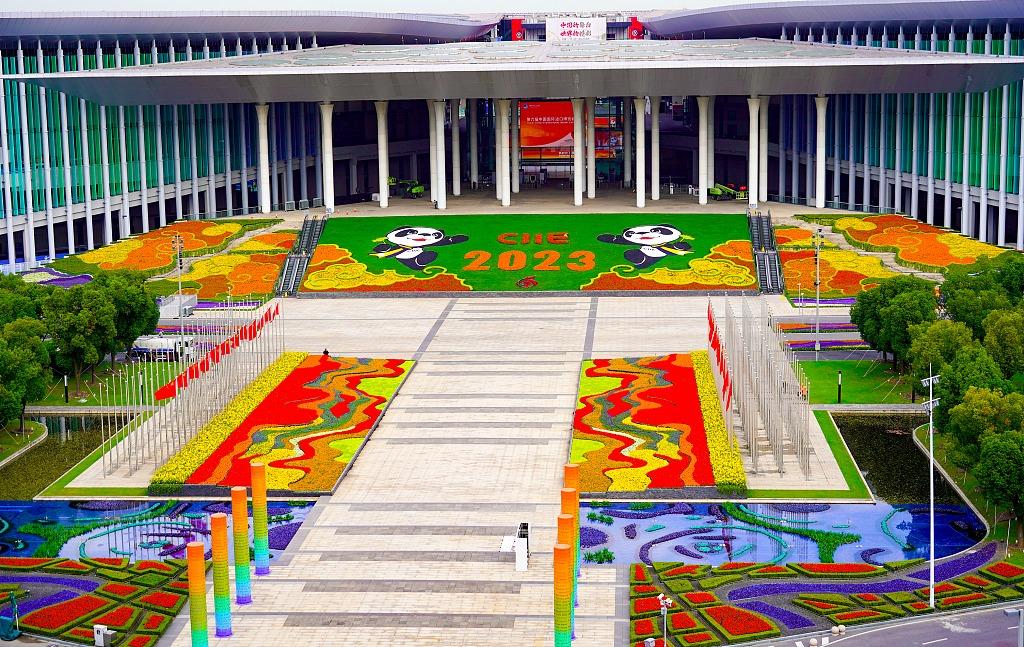 This photo taken on Oct 29, 2023 shows the south square of the National Exhibition and Convention Center (Shanghai), the main venue for the 6th China International Import Expo, in Shanghai. (PHOTO / VCG)
This photo taken on Oct 29, 2023 shows the south square of the National Exhibition and Convention Center (Shanghai), the main venue for the 6th China International Import Expo, in Shanghai. (PHOTO / VCG)
Agricultural representatives from the United States have called for stronger trade relations with China and voiced their opposition to politicization of the food sector.
Jim Sutter, CEO of the US Soybean Export Council, said that big countries such as China and the US are bound to have differences at the high level. "But at the agricultural level, we want to make sure we have a strong working relationship," he said in an interview on the sidelines of the sixth China International Import Expo, which concluded in Shanghai on Friday.
To deepen agricultural cooperation, we need to say no to attempts to politicize economic issues or overstretch the concept of security. ... China-US agricultural cooperation features complementarity and mutual benefit.
Xie Feng, Chinese ambassador to the United States
The US Department of Agriculture led 17 exhibitors — ranging from food-processing firms to exporters and packaging companies — to attend the six-day expo.
READ MORE: Efforts to stabilize China-US ties paying off
Jason Hafemeister, acting deputy undersecretary for trade and foreign agricultural affairs in the US Department of Agriculture, told China Central Television in a recent interview that Sino-US agricultural partnership dates back to the 1970s and has been mutually beneficial. "They (the two countries) should continue to reap the benefits of such engagements," he said.
The global agricultural sector is beset with major challenges such as food insecurity and practices that are environmentally less sustainable, according to Hafemeister. "How do we grow food in a way that protects the planet and doesn't add to the climate change (crisis)?"
Agricultural exchanges between the two countries and the resulting progress in these areas can help set a path for other countries to follow, which could benefit the whole planet, he said.
The calls for stronger agricultural trade and research ties came amid ideological disputes and geopolitical tensions between the world's top two economies. Such differences have expanded and affected agricultural collaboration in recent years.
Last month, authorities in Arkansas ordered Syngenta Seeds to divest its ownership of farmland in the US state, after China National Chemical Corporation acquired 80.7 percent of the company's shares in 2017.
Speaking last month at the US-China Sustainable Agricultural Trade Forum and Contract Signing Ceremony in Des Moines, Iowa, Chinese Ambassador to the US Xie Feng called the decision discriminatory and unfair.
Xie said there are still serious difficulties and challenges in Sino-US relations. "To deepen agricultural cooperation, we need to say no to attempts to politicize economic issues or overstretch the concept of security," he said.
China has emerged as one of the largest food importers thanks to globalization over the past two decades. The country's agricultural export volume is now 5.3 times the level in 2001, when the country joined the World Trade Organization, Chinese media reported.
Meanwhile, the volume of Chinese food imports is almost 14 times its 2001 level, and China is also the primary destination for agricultural products from the US.
ALSO READ: Chamber eyes stable Sino-US ties
Xie said at the Iowa forum that bilateral agricultural trade exceeded $50 billion last year. SinoGrain, China's State-owned importer, reportedly purchased 600,000 metric tons of soybean from its US supplier on Nov 7. This was the largest single-day soybean purchase by the world's top soybean importer since late July.
"China-US agricultural cooperation features complementarity and mutual benefit," he said. "China is the world's largest importer of agricultural products, while the US is the largest exporter."
Despite the differences, industry insiders participating in the forum spoke highly of China's achievements in agricultural development and its huge contribution to global food security.
ALSO READ: More US students expected to study in China
They emphasized that US-China agricultural cooperation is beneficial to both countries and the world, and expressed their readiness to make every effort to expand friendly exchanges and practical cooperation between the two sides.
Chairman of the US Grains Council Brent Boydston said the US grain industry supports free trade and wishes to overcome the challenges in bilateral relations and continue working with Chinese partners for win-win results.


